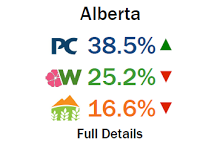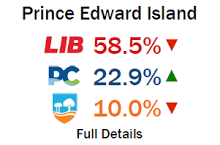skip to main |
skip to sidebar
With all of the controversy surrounding the prime minister's attendance at what the opposition parties call "cash-for-access" fundraising events, one might wonder why the Liberals are willing to risk the potential political cost for a few donations.
The party insists it's following the rules. But in the end, the political calculation might be an easy one — according to an analysis of Elections Canada data, the average event headlined by Justin Trudeau raises slightly more than $100,000 for the Liberal Party.
The prime minister and other members of his cabinet routinely attend fundraising events that come at a price of $1,500 per ticket, near the limit of donations allowed by Elections Canada. We don't know how much of the party's $12.2-million fundraising haul for the first three quarters of the year came from those events, but $1,500 tickets can pile up quickly.
You can read the rest of this article here.
The list of contestants in the running for the Conservative Party leadership has ballooned to 12. One official debate has already been held and the contours of the race are starting to become clearer.
So who is standing out from the pack with six months to go before members make their choice?
The dozen contestants include four MPs from Ontario (Michael Chong, Kellie Leitch, Erin O'Toole and Lisa Raitt), two from Quebec (Maxime Bernier and Steven Blaney), two from Saskatchewan (Andrew Scheer and Brad Trost) and one from Alberta (Deepak Obhrai), along with two former MPs (Chris Alexander and Andrew Saxton) and Manitoba physician Dan Lindsay.
It makes for a crowded field and a need for contestants to carve out a niche of their own. Leitch has pushed her screening of immigrants for "anti-Canadian values," while Bernier has proposed a series of libertarian-style policies. Chong has put forward a carbon-pricing plan and Blaney has endorsed a ban on the niqab in the public service and attacked Bernier over his views on supply management. Scheer and O'Toole have each touted a long list of caucus endorsements, while Trost has claimed the socially conservative ground in the race.
Is any of this moving the needle among party members?
To break it down, Conservative insiders Tim Powers of Summa Strategies and Chad Rogers of Crestview Strategy are back with host Éric Grenier on this week's episode of the Pollcast.
You can listen to the podcast here, subscribe to future episodes here, and listen to past episodes here.
Less than a year after implementation of Canada's community mailboxes was put on hold, a poll commissioned by the Liberal government indicates two-thirds of Canadians support a transition away from home delivery to these boxes in urban and suburban centres.
The poll also suggests Canadians are widely satisfied with the services they receive from Canada Post, but would be willing to accept some changes — including alternate day delivery.
You can read the rest of this article here.
In promising an end to what he called U.S. President Barack Obama's "war on coal," Donald Trump won the strong support of America's coal miners, who played an important role in his victories in two key swing states.
But the Liberal government's decision to phase out coal-fired power generation in Canada by 2030 is unlikely to have significant electoral ramifications for Prime Minister Justin Trudeau.
You can read the rest of this article here.
The results of the U.S. presidential vote came as a surprise to many. Almost every national poll gave Hillary Clinton a lead over Donald Trump and the polls also suggested she held the lead in enough states to win the election.
Instead, though Trump lost the popular vote, he won the electoral college and will be America's next president.
As mail-in votes continue to be counted in Democratic-friendly states, Clinton's edge over Trump in the popular vote will likely grow — and the national error in the polls will shrink. Still, at the state-level the error was significant enough to up-end expectations.
What did the polls miss? Was there a problem with how polls — and the uncertainty intrinsic to the science — were interpreted? And where does the media and the polling industry go from here?
Joining me on this week's episode of The Pollcast is pollster David Coletto, CEO of Abacus Data.
You can listen to the podcast here, subscribe to future episodes here, and listen to past episodes here.
Two Ontario provincial byelections on Thursday come at a difficult time for Premier Kathleen Wynne's Liberal government. Her party is at its lowest point in the polls in years and the premier's approval ratings are even worse than her predecessor's, Dalton McGuinty.
And when his ratings were plumbing new depths, McGuinty announced he would resign.
Byelections are being held in the ridings of Ottawa–Vanier and Niagara West–Glanbrook, the former a solid stronghold for the Liberals and the latter a bastion of the Progressive Conservatives.
You can read the rest of this article here.
Though six months remain before Conservatives choose their next party leader, nearly half of the Conservative caucus has already backed one of the 12 contestants officially in the running. Two of them, Andrew Scheer and Erin O'Toole, have received the bulk of these endorsements.
But if endorsements are at all reflective of organizational strength and membership support, where these endorsements are coming from might be as important as the number each contestant receives.
You can read the rest of this article here.












